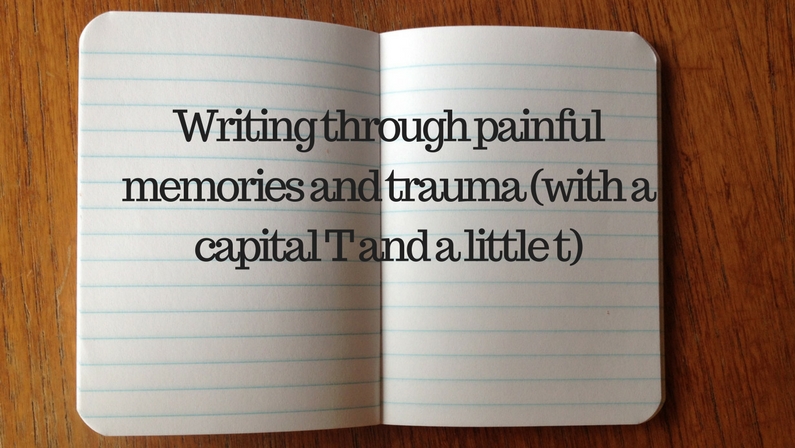This is a real and common challenge – how do we write about the compelling parts of our personal history when those tragic, comedic and painful memories are often tied to trauma that is still humming away inside of ourselves?
(If you’d like this post as a PDF, click here.)
I have some simple, gentle tools you can use on your own, as you’re writing, to defuse some of what arises (based on my 12+ years of experience offering hands-on bodywork, training in trauma and the nervous system, my own creative and healing journey and 4+ years teaching body-based transformational memoir-writing):
These tips also work well to help you get unstuck in creative projects.
10 ways to write through painful memories and trauma, and get creatively unstuck
1 – attend to your body first. As the saying goes – ‘the issue is in the tissue’ and our tissues/body will tell us what’s going on.
2 – If you’re feeling resistance, pain, overwhelm or any sort of unpleasant emotional/physical sensation, tune in. Notice what you’re feeling, without labeling it as ‘bad.’ Just focus on being present with the sensation.
3 – as you tune into the sensations, ask these questions: What is the internal colour? Texture? Temperature? Mood? As you ask, keep your attention on your sensations, asking yourself to soften into them and tracking any changes. Trust that it will always change. Always.
4 – breathe slower and deeper, but don’t focus on deepening the inhale. Instead, focus on extending the exhale. As you do this, keep noticing any changes in your mental/physical/emotional sensations.
5 – if memories/sensations get too intense, practice OMG (orient, mobilize,ground.) Orient by looking at your surroundings then letting your eyes land on and notice one tangible solid then, and notice three physical details about that thing. Do this two more times. Mobilize by wiggling fingers and toes. Then ground by sending your attention through your body and down into the earth via your sit bones, feet and tailbone. This will help you re-orient yourself if you’re getting overwhelmed.
6 – attend to your creative power. You can enter into an active imagination dialogue with your distress through your creative writing. Suspend judgment about this process, and start writing a dialogue. The first participant is you. The second is your sensation/mood/experience. Get curious and ask it about why it’s there, what it wants you to learn, etcetera. Keep going with a swift flow of writing, back and forth, until you feel you’ve shifted the distress/sensation. Don’t forget to be kind when you’re writing as yourself ☺
7 – try using your imagination to write from other more distanced people’s perspectives (about the experience you’re describing). If writing from the first person feels too charged, switch to a different person’s perspective. Describe the event from their eyes. Do this from as many different perspectives as you feel like. Go beyond human – from the perspective of the land, animals, plants. Etcetera.
8 – ask yourself what you need most in this moment. Is it water? A break? A walk in nature? Meditation/yoga/contemplative art-making or silence? High energy dancing? Allow your needs to be met by yourself. Then return to your writing.
9 – if it feels like too much to manage physical/emotional/mental distress and overwhelm on your own, please do seek out someone with specific training in nervous system trauma release. For nervous system trauma release I highly recommend people who are professionally trained and certified in Somatic Experiencing and/or Self-Regulation Therapy and/or biodynamic craniosacral therapy (BCST).
If you’re shopping around for a counselor/therapist/psychologist, it’s worth asking them if they have one or more of these trainings. Many therapists are adding these trainings to their existing skillset, and they’re wonderfully equipped to support you.
10 – work with me. My Art of Personal Mythmaking online course is designed to support healing and transformation while you write the first draft of your memoir (or continue generating an already started memoir.) You can learn more here.
Do you want a printable PDF with these tips? Click here to access it.
Janelle
_____
If you’re intrigued by Personal Mythmaking, I teach it live with weekly small class videocalls every January, as well as a start-anytime self-study version that includes monthly group coaching calls.
You’re also welcome to dip your toes in the water by signing up for my free 2 hour Outline Your Memoir workshop. You’ll get a sense of how I teach and you’ll finish with a sense of delight and excitement about working with your lifestory.

Recent Comments